Bloody Sunday: "I’m just so proud to be a Duddy and I hope I’ve done the name John Francis proud"
and live on Freeview channel 276
And yet 50 years on the Creggan man can vividly recall watching the crowds gather peacefully outside his Central Drive home in Creggan for the start of the Civil Rights march which ended in terror, chaos and bloodshed on a catastrophic day that ‘changed everything’.
Jackie was one of five brothers and a talented 17 year-old amateur boxer with dreams of joining the Merchant Navy. He was in a jovial mood as he met with friends among the throngs of people in front of the Creggan shops, preparing to set off on a short journey which would ultimately be his last.
Advertisement
Hide AdAdvertisement
Hide AdMickey idolised his charismatic big brother but was quickly ushered away by Jackie and told to go home as the fatal march began to make its way through the streets of Creggan.
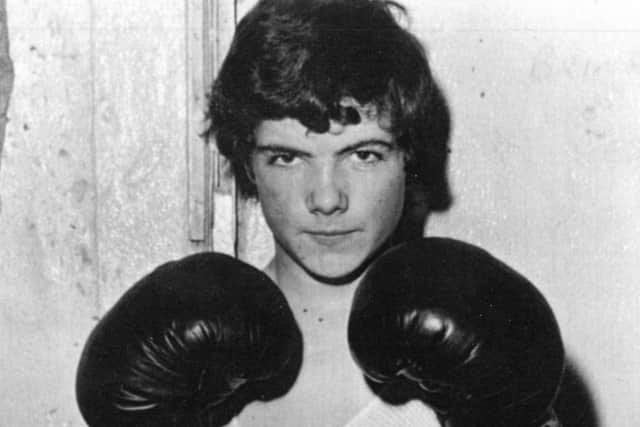

“I was always trying to knock about with Jackie as a wee boy, trying to hang about with the big brother,” said Mickey, sharing his personal account of events half a century later. “I was only 11 but I remember that day well. It was actually a day like today, a beautiful day.
“The march was gathering right outside our house on Central Drive. We lived beside the Telstar. I was down carrying on and Jackie was there with all his muckers, carrying on and eyeing up the women,” he smiles.
“As the march began I kind of trailed behind him. ‘Get you back that way’, he said. Apparently my da had warned the whole lot of them (his brothers and sisters) they were not to go to the march. I ran back up into the house.”
Advertisement
Hide AdAdvertisement
Hide AdIt was the final time he saw Jackie alive and it remains his enduring memory of that fateful day. Jackie was the first of 13 civilians killed in the massacre which had a profound impact on the people of Derry and beyond.
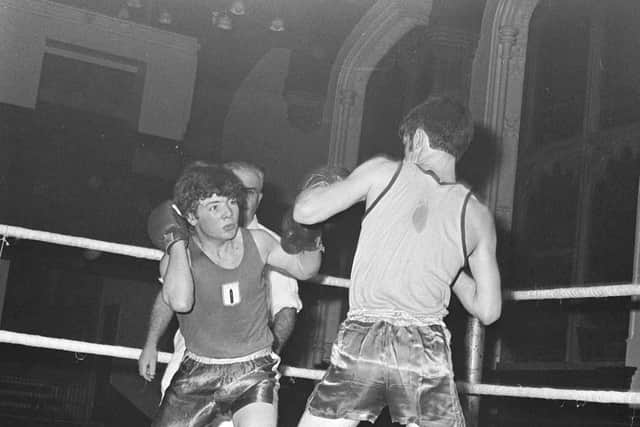

Pandemonium broke out and initial feelings of panic and fear were suddenly displaced by trauma and anger as news filtered through to the streets of Creggan about the horrific atrocities which had unfolded in the town centre.
“I came into the house,” continues Mickey, “And the rest of them (his siblings) were playing cards for pennies and they sent me down to the shop to get change. I’ll never forget it ‘til the day I die. I heard people shouting; ‘They’re shooting down the town, they’re shooting down the town’. I ran back up to the house and up the stairs. I shouted ‘Our Jackie was shot’ but I don’t know where it came from.
“I got a bat on the back of the head. ‘Don’t be saying that’. About 10 or 15 minutes later somebody came up to our house in tears and told us she heard Jackie was shot. The whole place was in pandemonium. What happened after that I wouldn’t be 100 percent sure but you could imagine yourself.
Advertisement
Hide AdAdvertisement
Hide Ad“But for some reason I shouted ‘Jackie’s been shot’ before we even knew he was shot. My sisters remember that.”
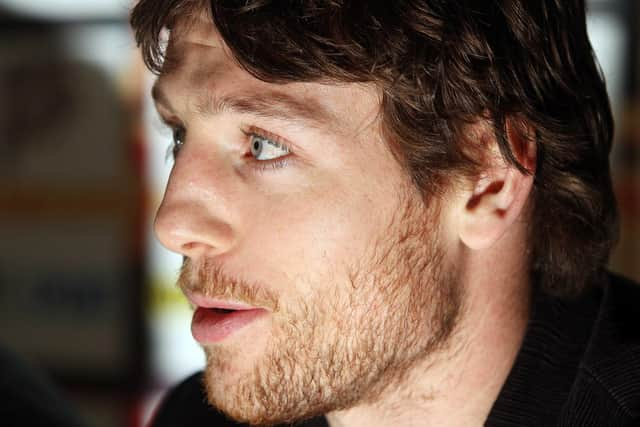

Mickey was robbed of his best friend and idol. And while his sister, Kay, and older brother, Gerry were relentless in the pursuit of justice over the next 40 years, Mickey opted for his own way to honour his brother’s memory.
Naming his first born after his fallen brother, Mickey - like his good friend and fellow boxer Charlie Nash whose brother William was also shot dead on Bloody Sunday - decided boxing, rather than politics, would be his release and his focus.
“Boxing saved us. The fact I was only 11, the anger, I couldn’t really do anything while I was that age. As much as I threw stones and bottles, we got slapped going into St Joseph’s Boys’ School for our hands being dirty. We did things like that but luckily enough by the time I was old enough I had got into boxing in a more serious nature.”
Advertisement
Hide AdAdvertisement
Hide AdJackie, a member of Longtower ABC, was an Ulster amateur boxing champion and had reached the All Ireland Finals in Dublin in 1969 - three years before his tragic death and it became Mickey’s ambition to become All-Ireland champion to make Jackie and his father, William James, proud.
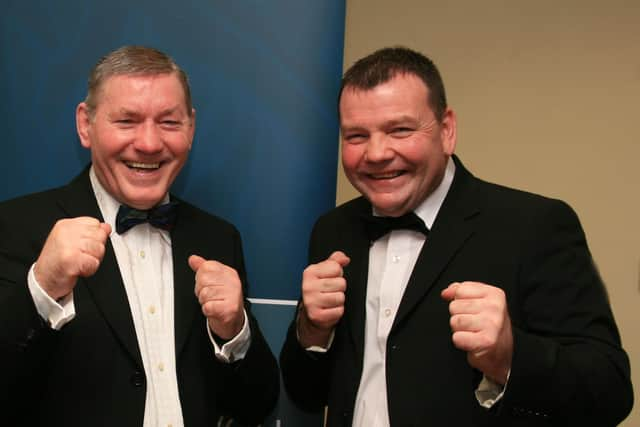

Little did he know, but Jackie’s love of boxing would ultimately prove the inspiration for a future world middleweight challenger and his namesake who wasn’t born until seven years after his death.
A loveable rogue, Mickey recalls how his brother would always be looking out for his siblings. He cherishes those special memories and provides an insight into the character of the defenceless teenager who was shot in the back by the crown forces as he fled.
“Everything was light-hearted with Jackie. He would be able to handle himself, he was tough and a hard man but you wouldn’t have thought it to look at him. He would’ve stuck up for someone he saw getting bullied.
Advertisement
Hide AdAdvertisement
Hide Ad“He used to take me around on a wee paper round and things like that and would’ve paid me to go to the swimming pool or paid for me to go to the pictures. He was a wile good natured fella and thought of everyone but himself. On the other hand he liked his pranks and carrying on but he was just a nice person.
“I got my interest in boxing through Jackie,” explains former light welterweight, Mickey who compiled a 3-4 record as a pro, and also served as a sometime sparring partner for the likes of Barry McGuigan, Ken Buchanan and Charlie Nash. “I was six years younger than him.
“We all came from big families and we had a small hallway at the bottom of our Central Drive home. That used to be our wee boxing gym where we had old gloves and everything else.
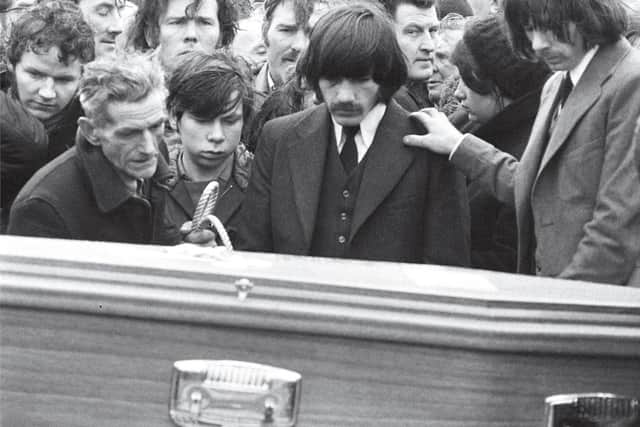

“Jackie would’ve been the main organiser of the fights. You would’ve had Patrick and myself and me being the youngest I used to get hit in the stomach but not very often. That’s where we learned how to fight and look after ourselves. That’s how we started boxing, as brothers carrying on.
Advertisement
Hide AdAdvertisement
Hide Ad"When Jackie was boxing he boxed out of the Longtower Boxing Club. I used to go with him maybe one night a week and always on a Saturday morning I used to carry his kitbag. I was his wee kitboy down to Alexandra Place which was a good dander down Stanley’s Walk, and down onto the Foyle Road. I still remember watching him sparring and boxing.”
Mickey later picked up the boxing mantle and went on to succeed where Jackie had narrowly failed in the National Finals, winning the All Ireland Youth title.
“He went down to Dublin for the All Ireland and was very unlucky to lose a tight contest in the finals of the All Irelands. I remember him coming home with a wee shield as runner-up. He was very, very close to winning the All Ireland championships in 1969. He had talent.
“People always ask me, ‘How good was Jackie?’ I always take it from his close friend Damien McDermott. For a 16 year-old, Jackie was weighing 10 stone so he was always fighting tough boys. Damien told me he was hard as nails and such a tough spar. Damien went on to become All Ireland senior champion and a successful pro.
Advertisement
Hide AdAdvertisement
Hide Ad“So who knows how far Jackie would’ve gone? Unfortunately we’ll never find out.
“But I said to myself, ‘Jackie got beat in the finals, I’m going to win the All Irelands’. I was doing it for Jackie’s memory and my old boy. I went on to win an All Ireland youth title and then I got married. When John was born he was named after Jackie, ‘John Francis’.”
John Francis Duddy would make an instant impact in the ring, winning an Irish senior light-middleweight championship in 2002 and going on to scale dizzying heights in the USA where the ‘Derry Destroyer’ was on the brink of a world title shot before retiring in 2011.
Bloody Sunday happened before he was born and his childhood home wasn’t a political one. And yet the shadow of that catastrophic day still follows him.
Advertisement
Hide AdAdvertisement
Hide Ad“We weren’t a political family,” explains Mickey. “My brother was shot dead but I made sure my wains weren’t politically motivated for revenge or anything else. Our Kay and Gerry kept up the family battle. I kept the boxing going for him and they did the other stuff. We’re a close family and all did our bit. They would be selling tickets for a Bloody Sunday event or campaign and I would be selling tickets for the boxing club.
“John would get a bit annoyed when people kept asking politically driven questions. He would simply say, ‘Jackie was my uncle. I didn’t get to meet him’ and that was it. That’s the way John dealt with it and I was proud of him for doing that. His uncle was murdered but we try and keep those feelings private.”
. . . . . . . . . . . . . . . . . . . . . . .
THREE THOUSAND miles away in Queens, New York City, former world middleweight contender John Duddy and his wife Grainne are rehearsing their roles for the star-studded reading of Richard Norton-Taylor’s ‘Bloody Sunday: Scenes from the Saville Enquiry’ at the newly refurbished Irish Arts Centre on 11th Avenue.
The reading will take place this Sunday to mark the 50th anniversary of that day which lit the touchpaper for the Troubles in Northern Ireland. Ten miles down the road in Brooklyn, a special mass will take place in Our Lady of Perpetual Help Basilica to commemorate the victims of the atrocity. It still amazes John how widespread the events of those days became and how it impacted so many.
Advertisement
Hide AdAdvertisement
Hide Ad“To have something like this which will be read on the main stage of the Irish Arts Centre and for them to acknowledge and show respect and honour what happened on that day and for me to be included in that is amazing. I’m under no illusions that this Duddy name has got me into many places. To be able to share the stories and remember Bloody Sunday is an honour. (It’s the) whole of Derry they’re honouring. There will be actors from everywhere, from Belfast as well but we’ll be the two Derry people in the middle of it.”
He may have done his best to avoid questions about his uncle’s death during his fighting career but he’s immensely proud of his history and the heroic efforts of his family who worked tirelessly to exonerate the victims of Bloody Sunday.
“It wasn’t about steering clear of the topic or my uncle Jackie because I know my uncle Gerry and auntie Kay, and my other aunties and uncles, have always fought the good fight for him,” said John.
“My uncle Jackie’s picture is still hung up in my daddy’s house. I grew up and he was always there. That’s not something I wanted to be banging on about in newspapers and interviews.
Advertisement
Hide AdAdvertisement
Hide Ad“As I said, my family were fighting the good fight and we always supported and stood by them. I didn’t want people to think I was using it as some way to open more doors or get famous. I would always say to people. ‘Look, you’re talking about a really traumatic event. I wasn’t born and my dad was 11 when it happened’. Jackie was his big brother and his idol.
“I can’t even fathom what it must’ve been like. You find some way to escape and I suppose the boxing gym was one form of escaping from it. After Bloody Sunday, how many young boys and girls signed up for the IRA? That was the fuse that lit the Troubles for the next 25 years or longer. It changed everything for the worse. Hopefully we’re at a stage, 50 years on, where we’re much more open about things.
“I’m very lucky and proud to be from where I’m from. My family supported me through everything I’ve done and I’ve always tried to support our family too. Hopefully there’s something positive for everything they’ve come through, whether that’s bringing people together or just talking to people. We’re building bridges not walls.”
John’s charming, infectious persona and boxing talent was always going to draw natural comparisons with his uncle Jackie.
Advertisement
Hide AdAdvertisement
Hide Ad“From the stories, Jackie was charming, likeable. He was a boxer and a hard man but never a bully. He was the life and soul of a party, a jokester who was always getting up to mischief.
“It’s crazy thinking about how everything is so open about it all now. When I was younger growing up, it was never talked about in front of us. I’ve done a lot of reading about it since, about the Tribunal and eye witness accounts.
“Where we’re from, we always play things down but it shows just how big an event it was in people’s lives. It changed people’s lives and not for the better. A lot of people were scarred for life. Hopefully after 50 years there can be some sort of release and these people can mend, heal and move forward.”
John’s father recognised several similar personality traits and a natural talent for the sport from an early age. However, he was keen to ensure John was very much his own man when he embarked on his glittering career.
Advertisement
Hide AdAdvertisement
Hide Ad“It’s funny, my first ever boxing match at the Ring ABC I won and the fight was stopped in the second round,” recalls John. “I remember the write-up in the ‘Derry Journal’ the following Tuesday and the headline said ‘Jackie Duddy’. I remember being shocked and asking my da and he rang up to tell them ‘Thanks for the write-up but his name is John. It’s John Francis. He’s his own man’.
“I remember thinking ‘Wow’. I was 10 and it was my first fight for the Ring down in Patrick’s Street where they had the gym beside Foyle Antiques. I always remember that.
“My da always said; ‘Boxing is too hard to be doing for other people, you have to do it for yourself’. After that it was always ‘John Francis’ or ‘John Duddy’ in any report. Looking back, it was always a thrill to get your name in the ‘Journal’. That was always the goal. Honestly it would be hard for anyone to live up to someone and to be compared to my uncle with that headline.
"Even over here (in the US) the amount of people who come up to me and ask me if Jack Duddy was anything to me. I started boxing because of my da but my da was involved in boxing because of Jackie.”
Advertisement
Hide AdAdvertisement
Hide AdWhen John fought Julio César Chávez Jnr. in San Antonio, Texas in June 2010 for the WBC Silver middleweight championship Jackie Duddy was honoured with the 10 bell salute. Both boxers bowed their heads in the centre of the ring and the final 10 count was observed impeccably by the thousands of Mexican fans in the Alamodome stadium. It was an emotional moment for John’s dad, Mickey, who travelled over for the fight.
“It was nice that the boxing fraternity did that,” smiles John. “It was amazing because there were 90 per cent Chavez fans at that fight. It was the first time I ever went into an arena and they booed me. But for the 10 bells you could’ve heard a pin drop. They were so respectful. Proper boxing fans. As soon as that was done, and they called out ‘Duddy’, all you heard was booing again. But for the 10 bells they were so respectful.”
The events of Bloody Sunday still impact John’s life to this day. Now making a living from acting and personal training in New York, John has been invited to represent Derry and the family of the victims in Sunday’s poignant reading at the Irish Arts Centre.
“As we were talking there I’m not sure why but I had an image of a pebble being dropped in a pond. But Bloody Sunday wasn’t a pebble, it was a massive meteorite that slammed into the world and into Derry city. The ripple effects of that has affected so many people but I hope that maybe people can experience a positive influence like it’s had on me to chase my dreams down. You don’t know what tomorrow brings and you have to keep fighting the good fight. I’m just really lucky to be from the family I’m from.
Advertisement
Hide AdAdvertisement
Hide Ad“I’m just so proud of my auntie Kay and my uncle Gerry and the Duddy family, and all the families of Bloody Sunday who never, ever gave up. They never, for one second, doubted the innocence of the people who were shot that day. Never once under all the scrutiny and the bad publicity.
"They always stood proud and had immense dignity. And that’s why there’s a church over here in the middle of Brooklyn that still does a mass for the people of Derry who lost their loved ones on Bloody Sunday - because of the way they conducted themselves over the years and now people can finally see what the atrocity inflicted on us.
“Hopefully people can have some closure after fighting the good fight. Their loved ones have all been exonerated and hopefully it can be a beacon for the future so people don’t go down that path again. I’m just so proud to be a Duddy and I hope I’ve done the name John Francis proud.”
His father has no doubts about that; “Proud is an understatement but I’m sure Jackie and the old boy would’ve been proud too,” adds Mickey.
“The old boy loved boxing. He loved Jackie boxing, he loved me boxing. If he had been about to see John boxing it would’ve been nice. You’d like to think they’re all up there smiling down.”